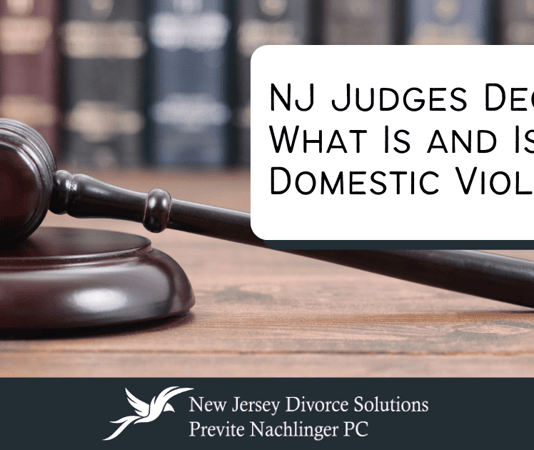NJ Judges Decide What Is and Is Not Domestic Violence

Domestic violence is, unfortunately, an all too common occurrence in our world, and as a result, New Jersey Superior Court judges sign into effect thousands upon thousands of Temporary Restraining Orders statewide every year. In our court system, the entry of a Temporary Restraining Order results in the scheduling of a hearing as to whether a Final Restraining Order should be entered. This hearing is a trial, or in other words, a formal examination of the available evidence (e.g., witness testimony, documents such as e-mails and text messages, audio and video evidence, etc.) before a judge in order to determine whether or not the alleged domestic violence, in the context of the prior history of the parties’ relationship, justifies the entry of a Final Restraining Order against the Defendant.
There is no jury in a domestic violence trial; the judge presides over the conduct of the hearing and makes the finding at the conclusion of the hearing. The decision of the judge hinges on whether the evidence submitted proves that (a) an act of domestic violence occurred, and (b) that protection is necessary for the victim going forward. Whatever the judge’s determination, the manner in which he or she conducts the hearing and his or her findings of fact (including the credibility of the parties’ testimony) will be given a great deal of deference if one party seeks to appeal the entry or denial of a Final Restraining Order, as was demonstrated in the recent Appellate Division decision in R.R.C. v. P.F.
In this case, a Final Restraining Order hearing was conducted regarding allegations that the Defendant had engaged in harassment and criminal sexual contact toward the victim. At the hearing, the victim testified that the Defendant followed the victim and her sister around in a public park and verbally harassed her and made unwanted physical contact with her and her sister corroborated this narrative with her own testimony. The Defendant then testified that nothing had occurred.
At the conclusion of the hearing, the judge entered a Final Restraining Order, finding that the Defendant had in fact harassed the victim and that the restraining order was necessary to protect the victim from further acts of domestic violence. Crucially, as part of his findings, the judge stated that the victim’s testimony regarding the incident was far more credible than the Defendant’s.
The Defendant then appealed, arguing, among other things, that the trial court had erred in finding that an act of domestic violence took place. The Appellate Division found no merit to the Defendant’s argument and affirmed the entry of the Final Restraining Order. In doing so, the court explained that a trial judge’s findings of fact are given significant deference by the Appellate Division and that in this matter there was no reason that they could find to deviate from the trial court’s findings.
The Appellate Division’s decision simply upholds a long line of case law emphasizing that a trial judge’s factual findings, especially with regard to witness testimony, are to be respected absent exceptional circumstances. There is good reason behind this judicial precedent: the trial judge is observing the witnesses testify in his or her physical presence, during which time he or she can gauge their emotional response, their mannerisms, and their general demeanor. By contrast, the Appellate Division is simply reading the spoken words reproduced in writing by the court reporter, which of course does not convey all of the non-verbal cues that humans offer as to their truthfulness when they speak, especially when that speech is coming under oath before a judge.
Litigants proceeding to a Final Restraining Order hearing, whether as the victim or the Defendant, should understand that the majority, and often, the only, evidence presented at these hearings is the respective testimony of the parties. As a result, witness testimony is often the decisive factor in whether or not a Final Restraining Order is entered. It is therefore critical for a litigant facing this type of hearing to prepare extensively with an attorney beforehand. This preparation is carried out in an effort to present the most convincing possible testimony and avoid the pitfalls and mistakes which can befall even the most truthful witness in the pressure packed environment of a courtroom, because the judge’s impression of the witness’ credibility will typically be the last word on the subject.
